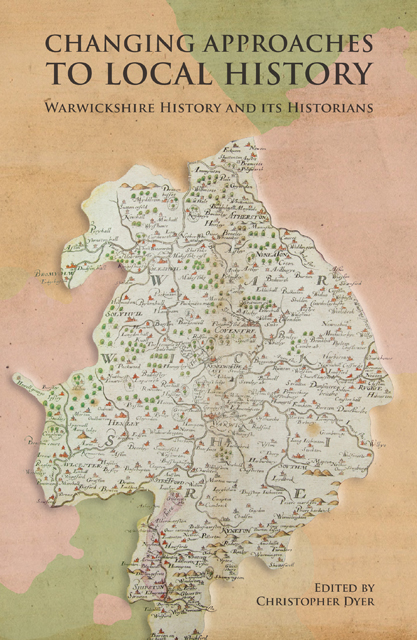Book contents
- Frontmatter
- Contents
- List of Illustrations
- Notes on Contributors
- Foreword
- Acknowledgements
- List of Abbreviations
- Introduction
- 1 The Dugdale Society: Its First Hundred Years
- 2 The Beginnings of Coventry
- 3 Was Commerce in Late Medieval Coventry Restricted by Regulation?
- 4 Studying Late Medieval Small Towns in Warwickshire 1920–2020
- 5 Rural Warwickshire in the Middle Ages: Society and Landscape
- 6 Religion, Rebellion and Red Jackets: Changing Approaches to Society and Politics in Sixteenth-century Warwickshire
- 7 Social Networks, Intellectual Affinities and Communal Harmony in Post-Reformation Warwickshire
- 8 Discovering Warwickshire’s Vernacular Architecture
- 9 Local History and the English Civil War: A View from Warwickshire
- 10 Writing Histories of the Landed Elite in Georgian Warwickshire
- 11 The Victoria County History in Warwickshire
- 12 Writing Women into the Political History of Warwickshire
- 13 Shakespeare and the Warwickshire Landscape in the Age of the Tourist
- Conclusion
- Index
3 - Was Commerce in Late Medieval Coventry Restricted by Regulation?
Published online by Cambridge University Press: 17 December 2022
- Frontmatter
- Contents
- List of Illustrations
- Notes on Contributors
- Foreword
- Acknowledgements
- List of Abbreviations
- Introduction
- 1 The Dugdale Society: Its First Hundred Years
- 2 The Beginnings of Coventry
- 3 Was Commerce in Late Medieval Coventry Restricted by Regulation?
- 4 Studying Late Medieval Small Towns in Warwickshire 1920–2020
- 5 Rural Warwickshire in the Middle Ages: Society and Landscape
- 6 Religion, Rebellion and Red Jackets: Changing Approaches to Society and Politics in Sixteenth-century Warwickshire
- 7 Social Networks, Intellectual Affinities and Communal Harmony in Post-Reformation Warwickshire
- 8 Discovering Warwickshire’s Vernacular Architecture
- 9 Local History and the English Civil War: A View from Warwickshire
- 10 Writing Histories of the Landed Elite in Georgian Warwickshire
- 11 The Victoria County History in Warwickshire
- 12 Writing Women into the Political History of Warwickshire
- 13 Shakespeare and the Warwickshire Landscape in the Age of the Tourist
- Conclusion
- Index
Summary
Coventry’s medieval government believed in vigilantly policing the lives of the city’s citizens. Many of Coventry’s ordinances were economic in focus and most historians have considered this level of regulation to have been an excessive burden on local businesses and employed solely as a way of impeding competition. This chapter examines the city’s commercial regulations, particularly those relating to manufacturing and industry between 1421 and 1555, how historians’ interpretations of these have altered in the last hundred years and how we might construe these regulations today. It argues that the men who made up this civic administration saw their role as managers or overseers of all of Coventry’s late medieval industry in support of the mutual interests – especially in terms of economic prosperity – of the city and its inhabitants. They attempted to manage the city’s industrial production, via the leet court, through regulation.
Between 1904 and 1913 Mary Dormer Harris edited and published one of the most important artefacts from Coventry’s medieval history: The Coventry Leet Book. This is a record of the city’s leet court in which the ordinances (and much other business) of the elected mayor and his council of leading city officials were recorded. It is this document, the pronouncements, regulations and ordinances of the city’s government promulgated through this court, that forms the basis of this chapter. Dormer Harris’s early studies of the Leet Book yielded important and enduring results. The story she told – building on Alice Green’s 1894 important work – particularly in her seminal 1898 Life in an Old English Town, is one of a despotic city government, comprising prosperous, landed, merchants, who attempted to subdue rebellious craft guilds through rigorous regulation and a pernicious management of prices and wages. Dormer Harris was a progressive, a socialist, vice-president of the Workers Educational Association – which delivered quality education to working people – an active suffragist and an advocate of women’s rights. These themes can be clearly perceived in her belief that Coventry’s medieval working people were being oppressed by a wealthy and powerful oligarchy. The importance of her editions of the Leet Book can be seen in their widespread use by historians in the last hundred years to understand later medieval urban life.
- Type
- Chapter
- Information
- Publisher: Boydell & BrewerPrint publication year: 2022



